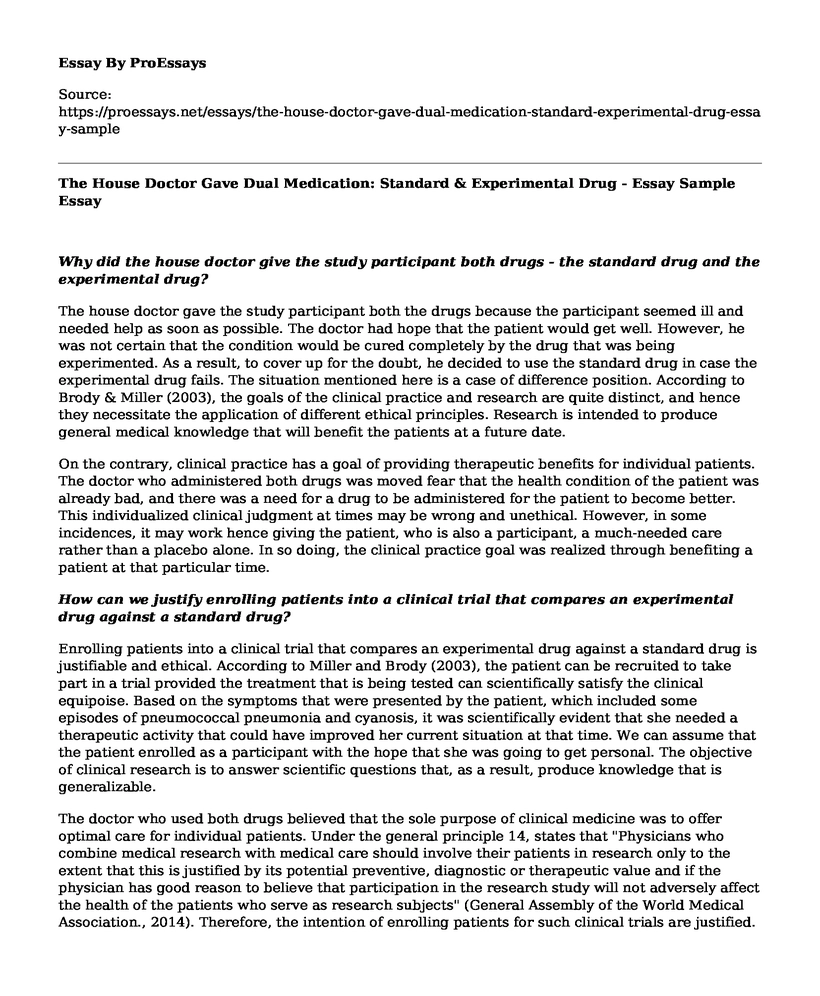Why did the house doctor give the study participant both drugs - the standard drug and the experimental drug?
The house doctor gave the study participant both the drugs because the participant seemed ill and needed help as soon as possible. The doctor had hope that the patient would get well. However, he was not certain that the condition would be cured completely by the drug that was being experimented. As a result, to cover up for the doubt, he decided to use the standard drug in case the experimental drug fails. The situation mentioned here is a case of difference position. According to Brody & Miller (2003), the goals of the clinical practice and research are quite distinct, and hence they necessitate the application of different ethical principles. Research is intended to produce general medical knowledge that will benefit the patients at a future date.
On the contrary, clinical practice has a goal of providing therapeutic benefits for individual patients. The doctor who administered both drugs was moved fear that the health condition of the patient was already bad, and there was a need for a drug to be administered for the patient to become better. This individualized clinical judgment at times may be wrong and unethical. However, in some incidences, it may work hence giving the patient, who is also a participant, a much-needed care rather than a placebo alone. In so doing, the clinical practice goal was realized through benefiting a patient at that particular time.
How can we justify enrolling patients into a clinical trial that compares an experimental drug against a standard drug?
Enrolling patients into a clinical trial that compares an experimental drug against a standard drug is justifiable and ethical. According to Miller and Brody (2003), the patient can be recruited to take part in a trial provided the treatment that is being tested can scientifically satisfy the clinical equipoise. Based on the symptoms that were presented by the patient, which included some episodes of pneumococcal pneumonia and cyanosis, it was scientifically evident that she needed a therapeutic activity that could have improved her current situation at that time. We can assume that the patient enrolled as a participant with the hope that she was going to get personal. The objective of clinical research is to answer scientific questions that, as a result, produce knowledge that is generalizable.
The doctor who used both drugs believed that the sole purpose of clinical medicine was to offer optimal care for individual patients. Under the general principle 14, states that "Physicians who combine medical research with medical care should involve their patients in research only to the extent that this is justified by its potential preventive, diagnostic or therapeutic value and if the physician has good reason to believe that participation in the research study will not adversely affect the health of the patients who serve as research subjects" (General Assembly of the World Medical Association., 2014). Therefore, the intention of enrolling patients for such clinical trials are justified.
References
Brody, H., & Miller, F. G. (2003). The clinician-investigator: unavoidable but manageable tension. Kennedy Institute of Ethics Journal, 13(4), 329-346. doi:10.1353/ken.2004.0003.
General Assembly of the World Medical Association. (2014). World Medical Association Declaration of Helsinki: ethical principles for medical research involving human subjects. The Journal of the American College of Dentists, 81(3), 14.
Miller, F. G., & Brody, H. (2003). Therapeutic misconception in the ethics of clinical trials.(A Critique of Clinical Equipoise). The Hastings Center Report, 33(3), 19-30. https://doi.org/10.2307/3528434
Cite this page
The House Doctor Gave Dual Medication: Standard & Experimental Drug - Essay Sample. (2023, Apr 01). Retrieved from https://proessays.net/essays/the-house-doctor-gave-dual-medication-standard-experimental-drug-essay-sample
If you are the original author of this essay and no longer wish to have it published on the ProEssays website, please click below to request its removal:
- Health Problems in Urban Community Essay
- Research Paper on Social Work Planning a Needs Assessment
- The Future of Politics in Quebec and what this means for Canada essay
- Essay Sample on Challenges Faced in Nurse-Patient Therapeutic Relationship
- Essay Sample on Humanitarian Pooled Funds: Financing Global Emergencies
- Nurses' Leadership in Transfer-of-Care Communication: Best Practices - Annotated Bibliography
- Essay Example on US Healthcare Reform: Reducing Uninsured, Affordability and Expansion







